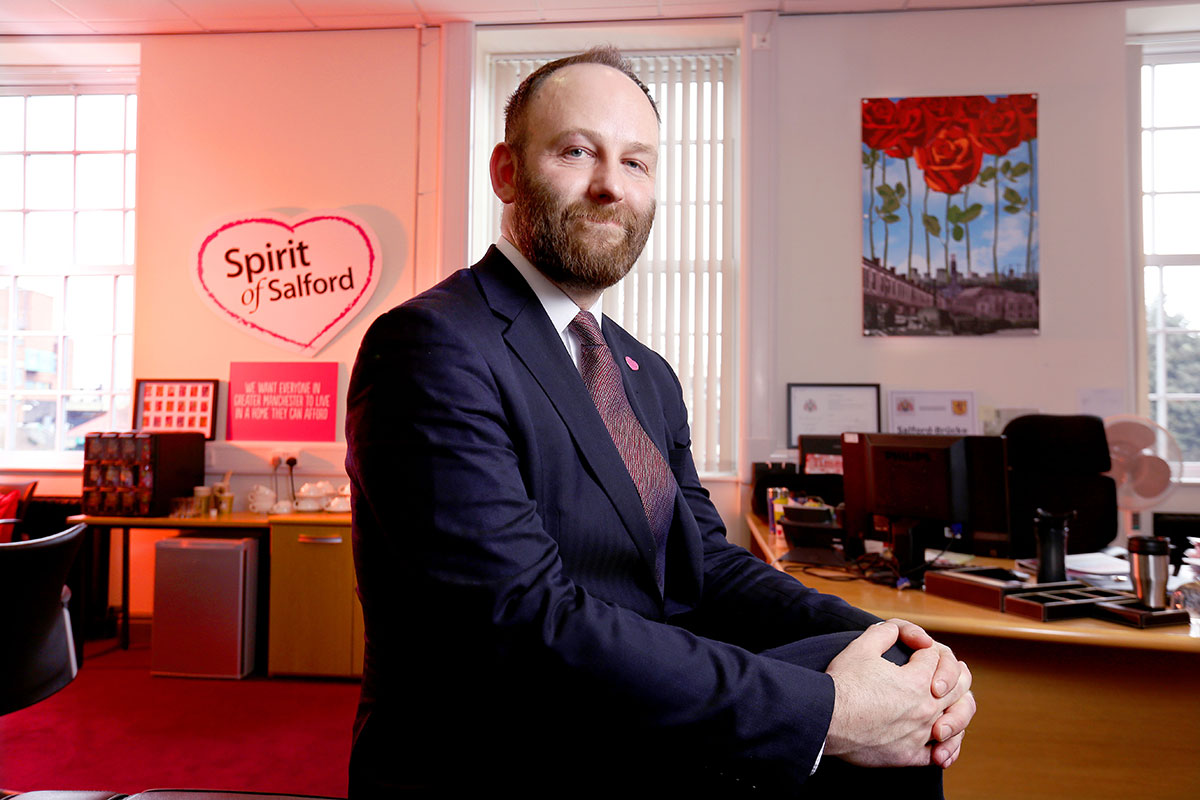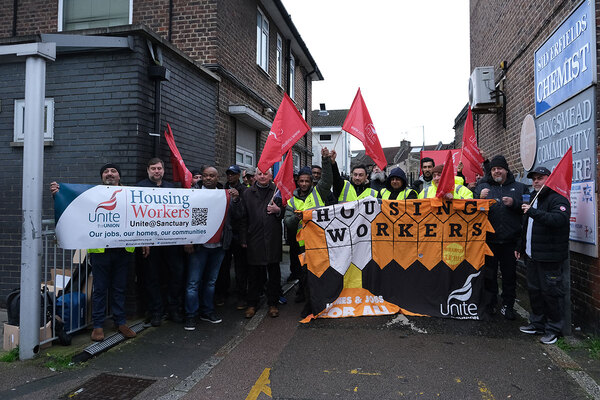You are viewing 1 of your 1 free articles
Colette McKune: ‘We have to do things differently’
ForViva’s new chief executive may have been in the job only a few weeks, but as Gavriel Hollander finds out, she is not afraid to speak her mind. Photography by Vicky Matthers/Iconphotomedia
Almost the first thing Colette McKune tells Inside Housing – after the obligatory offer of a cup of tea of course – is that she spent her first day as chief executive of ForViva on a beach in Turkey.
“I’m more ‘work to live’,” she smiles. “Oh God, yeah! My greatest motivation is things like holidays.”
It is a disarming, not to say refreshing, admission. It is also an early indication that we are not dealing with a typical housing association boss.
When Ms McKune sweeps into a meeting room at ForViva’s Eccles head office in western Manchester, she greets Inside Housing with a cheery: “Hi, I’m Col.”
She is always just ‘Col’, she later adds, maintaining her informality even as she adapts to the added responsibility of life as leader at the company where she has worked for the past decade. When we meet in July, Ms McKune has officially been in post barely six weeks, though it would be hard to tell from her relaxed, confident demeanour.
And while she might value those holidays – “If I don’t have the time off to recharge my batteries, then I don’t have the strength to lead an organisation like this” – she is highly aware of the importance of her roll at a critical juncture for both the organisation she leads and the wider sector.
She takes over at ForViva as a new group structure is still bedding down and a major development programme is gearing up.
The new structure, initially mooted a little over 12 months ago and put in place at the start of this financial year, is designed to simplify what has become, through various mergers and acquisitions, a somewhat sprawling organisation.
As a corporate entity, ForViva doesn’t even describe itself as a housing association. Rather, it is a “social purpose group”.
Indeed, ForViva itself does not own any property but instead provides services for its subsidiary organisations. These include: registered provider ForHousing – which as of April incorporates City West Housing Trust, Villages Housing Association and Villages Community Housing Association; Liberty Group, the property services firm that was acquired in 2016; and private rent and market sale arm ForLiving.
The restructure has led to the Regulator of Social Housing grading the landlord ‘G2’ for governance, although Ms McKune is sanguine about what she hopes is a temporary situation.
“When you are filling in an FFR [financial forecast return] with the regulator, it all becomes very complicated,” she explains. “We are G2 because we restructured. We had our IDA [in-depth assessment] about 18 months ago and it was [the top rating of] ‘G1/V1’, but the regulator has quite rightly said that because this was a new body there’d be an interim judgement which would be G2.”
Ms McKune actually admits that it was a comment from the regulator that provided the catalyst to make the structure easier to digest.
“The lead regulator at the time [of the IDA] said we were more like [listed housing repairs and social care contractor] Mears,” she recounts. “It hit a nerve. We thought, ‘This is getting more complex,’ so we needed to look at whether this is efficient.
“All those individual organisations have individual boards and it takes a lot of money to have the different brands and different communication flows. So we thought we need to change this, and the way to do that was to simplify it.”
On the surface at least, things were simpler when City West first started life a little over a decade ago.
Back then, the landlord emerged as the stock transfer association for Salford City Council, taking on 14,500 homes and with the promise of a £250m investment programme. Ms McKune, who had previously been managing director at procurement consortium Fusion 21, joined as
director of asset management.
However, it was anything but an easy birth for the landlord. The transfer itself went through on 8 October 2008. That day the government announced a £50bn bailout package for banks left floundering in the midst of the biggest financial crisis in living memory. Some of those banks – Royal Bank of Scotland, Nationwide, Barclays – were among the housing sector’s biggest funders.
“Everything just went into freefall,” says Ms McKune, remembering her first days on the job. “We were lucky to get banker funding. We had a grant and a programme in place [but] it was touch and go whether it was going to happen.
“It did happen and what we had to do was deal with a collapse in the market. Contractors were going bust, funding was difficult and it was an incredibly difficult time. There was talk of pulling back grant, reducing the grant, taking it away.”
“It doesn’t matter how much we’ve grown and how much we’ve diversified, at the core of everything we do is social housing”
The native Liverpudlian admits that there was concern among the team tasked with setting up the new landlord. “We’d all left jobs at other organisations. None of us were just hanging around doing nothing.”
But the adversity brought about some innovative thinking from Ms McKune and her new colleagues.
“We needed to look at doing things differently,” she explains. “We knew we couldn’t just do things the same way as everyone else had done it.”
In terms of the initial post-transfer stock investment programme, that meant thinking creatively about how to deliver it in a tighter funding environment by, for example, insisting on higher specification parts and thereby having longer replacement times.
That may seem like a slightly techy example – drawn from Ms McKune’s background in procurement – but it illustrates two characteristics which seem to be central to how she operates: leadership and originality.
And these characteristics are to the fore again when she discusses her role as a leader in a wider context than just ForViva. As a female chief executive of a major housing association, she feels there is extra scrutiny on her.
“The pressure is great,” she agrees. “I have to live and breathe the values of this organisation, and I have to be conscious of my behaviour and of my language.”
Does that rule apply more to her than her male predecessor Tim Doyle? “Without a shadow of a doubt. It’s different [for me]. There’s as many people wanting me to fail as wanting me to succeed. There are men and women out there who want you to fail.
“I don’t think all women who reach the heights of leadership are necessarily the best advocates for women in organisations. I don’t believe they necessarily bring women through the ranks.”
One of her first jobs, she says, is to have conversations with all her staff about how to improve inclusivity.
“I’m not a great fan of positive discrimination,” she continues, warming to a subject that is clearly a favourite. “I believe in a meritocracy. But I believe you should open up the opportunity for people to show their merit.
“Will I change some things? Yes. I want to be less paternalistic/maternalistic; [it’s about] empowering people to do things themselves. This isn’t just about staff but how we empower tenants, too.”
Ms McKune has some form in this area. She was awarded an MBE in 2015 for her work getting young people into employment after stipulating to contractors that worked with City West that they needed to take on apprentices if they were to win contracts.
She says she initially thought the letter was “a wind-up” from then-boss Mr Doyle. She describes her day at Buckingham Palace – “I didn’t get the Queen, I got Prince Charles but that was alright” – as “one of the proudest moments of my life”, while admitting her father “would turn in his grave”.
“He was the ragged-trousered philanthropist,” she adds by way of explanation. “He was a socialist, but I do think he’d be incredibly proud.”
Ms McKune now has a family of her own. She and her wife, Jen, have four grandchildren between them and married in May, 10 years to the day after signing their civil partnership. “The country wasn’t quite as enlightened as it is now,” she says with an ironic laugh.
“I believe in a meritocracy but I believe you should open up the opportunity for people to show their merit”
Having grown up in a council house in Liverpool’s Norris Green, Ms McKune is passionate about the importance of social housing. She insists that the various commercial bolt-ons that helped create ForViva are all about protecting – and even growing – its social housing assets.
She describes the business as having a “commercial head, social heart”, adding: “It doesn’t matter how much we’ve grown and how much we’ve diversified, at the core of everything we do is social housing.”
But the right words aren’t enough when it comes to protecting and investing in social homes.
“You can’t do things the way you’ve always done them,” she insists, returning to a theme. “If we’re truly going to maintain the properties to the standards that tenants aspire to and require, if we’re going to build new homes in the face of decreasing grant and the threats to rent, we have to do things differently.”
Despite branching out into commercial tenures, Ms McKune says that overall numbers of social homes owned by ForViva have increased over the years: “We’ve built more than we’ve lost in Right to Buy.”
A new £180m investment programme is also under way, which promises 1,200 new homes. Among these will even be a number offered at below social rents, run by the group’s specialist homelessness services arm ForFutures. “We’re targeting people whose only other option is potentially homelessness,” explains Ms McKune.
But above and beyond building new homes, she believes a landlord’s social responsibility lies in engaging with tenants.
“There’s as many people wanting me to fail as wanting me to succeed”
She says she remembers “feeling very ill” when she woke up on the morning of 14 June 2017 and saw Grenfell Tower in flames. But what angered her more was what came next.
“I find it very sad what happened that day,” she continues. “But what I find even sadder is what happened on the following days.
“The fact that you had people in one of the richest countries in the world, in one of the richest parts of that country, who didn’t have anywhere that night, who didn’t have food, didn’t have clothes. They were being given it by charities. But where were the leaders of the organisation that ran that high rise?”
At ForViva, a third of the board has always been tenants. Ms McKune says tenant involvement is “part of our DNA”.
She explains: “These are people’s homes and you have to listen to them. You don’t always have to agree with what people say – sometimes it’s OK to disagree as long as you’re telling the tenant why. But ignoring them is not OK.”
She may be new to the top job, but Ms McKune is clearly not afraid to speak out on issues she is passionate about. She might love her holidays but she promises to use her elevated position to fight for the causes she believes in: improving opportunities for women, tackling homelessness and empowering tenants.
Underneath it all is a belief in social housing as a positive force. As she puts it: “I was brought up in social housing – that’s what I know.”
Future of Work Festival
New for 2019, Inside Housing’s Future of Work Festival will bring together HR and organisational development professionals from the housing sector to discuss and explore the challenges of how to successfully evolve towards the working environment of the future.
Seize this opportunity to rethink your workforces and workplaces by reconsidering the roles of individuals, organisations, automation technology and how society will approach work.
Assess and benchmark your business strategy with the leaders in the housing sector:
- Defining the Future of Work: what does it look like, what will be the implications, how do you rethink your workforce strategy?
- How to embed Electronic Data Interchange into your workforce, attract the widest pool of talent, be authentic and innovative, keep your workforce happy and productive, and position your brand
- Identifying, assessing and closing the skill gaps: what skills will be required in the future and how do you prepare for the undefined?
- Appealing to and maintaining a multi-generational workforce: how to address differing career aspirations, expectations, behaviours and values
- How best to implement the best tech, for example, big data, artificial intelligence, automation, blockchain and the Internet of Things. How will this change workplace skills and wages? How do you evolve towards a ‘STEMpathetic’ workforce?
- Providing your HR and OD department with the right skills and toolkits to revise talent, organisational structures and business models. Be social and environmentally friendly, and data driven – investing in disruptive tech, skills training and ethical use of tech
- Promoting well-being and employee experience
- Introducing training and learning as part of the career path
- Embracing agile working – understanding how flexible and alternative working arrangements can boost productivity
The festival will take place on 17 September, at Westminster Bridge, County Hall in London.















